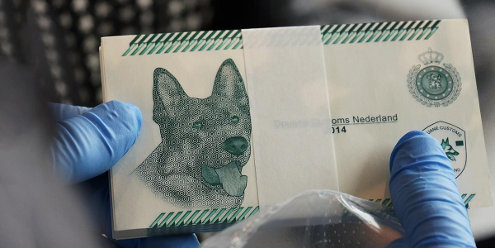
It was 1914, there was a world war being fought, and a clever man thought he had found a way to smuggle a horse.
In that year, exporting horses from Azewijn, in the neutral Netherlands, to warring Germany was illegal. As local newspaper De Graafschap-bode told the story at the time:
L. Lueb, 32 years of age and farmer in Klein Netterden (Germany) is being tried for exporting a horse on 7 September 1914 from the municipality of Bergh across the border at Klein Netterden, by pulling said animal through the water of said canal towards the place from which he was pulling whilst standing on the German side of the border canal while the horse was on the other side of said canal, with clear intent and by means of a rope tied around the neck of said horse.
People used so many words in those days…
The courts could just smell that Mr Lueb was guilty, but legally, a whiff is not enough. A law needs to be found by which to convict a person. But more than that, they had to agree they had jurisdiction. The law rarely determines that somebody can be tried for something they did in another country.
The result was that the case ended up before the Dutch supreme court.
The original court held that not the location of the perpetrator, but rather the ‘exportable object’ determined the location of the crime, Haal Je Recht writes.
The appeals court disagreed and came up with a post-human solution: the rope is an extension of the arm, and the arm was on Dutch soil at the time of the crime. The Dutch supreme court reworded the verdict, but came pretty much to the same conclusion: one can use an instrument to act in a different place from where one currently is.
In our current day and age, it has become much easier to use an instrument to act in a different place. The supreme court referenced the Case of the Horse of Azewijn as recent as last year when it convicted skimmers who had tried to plunder Dutch bank accounts from an ATM in Milan, Italy.
In 1915, Mr Lueb was convicted to a prison sentence of three months. What happened to the horse, I don’t know.
Photo of he German – Dutch border canal near Netterden by Pieter Delicaat, some rights reserved.



 A 56-year-old Dutch woman, Anna B. as she calls herself, was caught smuggling 8 kilos of “very good Dutch weed” into Italy, two years ago. Her lawyer managed to make it so that after a few months she could spend the rest of her 3 year 4 month sentence under house arrest. Friends got her an apartment in what appears to be a very idyllic village in Lombardia, and another stroke of luck made it so that she got two hours a day to go to the supermarket, time she uses to go hiking.
A 56-year-old Dutch woman, Anna B. as she calls herself, was caught smuggling 8 kilos of “very good Dutch weed” into Italy, two years ago. Her lawyer managed to make it so that after a few months she could spend the rest of her 3 year 4 month sentence under house arrest. Friends got her an apartment in what appears to be a very idyllic village in Lombardia, and another stroke of luck made it so that she got two hours a day to go to the supermarket, time she uses to go hiking.